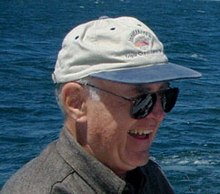Gordon Moore
American businessman (1929–2023)
(Redirected from Gordon Earle Moore)
Gordon Earle Moore (January 3, 1929 – March 24, 2023) was the cofounder of Intel Corporation and the author of Moore's Law (published in an article April 19, 1965 in Electronics Magazine).

Quotes edit
- Some things may have been tried before their time, but if these things don't violate the laws of physics they are likely to prove possible the next time around. Engineering is a series of failures with an occasional success. At least the kind where you are really looking at new technology. You tend to try things. You try things that are extrapolations of what has happened before. A lot of them don't work. Occasionally, you hit one that does. That's the way we make progress. Failures are not something to be avoided. You want to have them happen as quickly as you can so you can make progress rapidly. But, I've known technical people who are very competent but who would avoid doing a critical experiment. They would kind of work around the problem and do the things where the results were relatively straightforward, but they hated to do that experiment that might tell if their whole approach was right or wrong. And these people were relatively nonproductive. Then I've known other people who weren't perhaps as bright as the ones that worked around the problem who jumped right at the heart of the matter. They turn out to be the most productive. So my single piece of advice is don't delay making the critical test. That's the one that will tell you if you are right or wrong and where to go next.
- From an interview conducted by Ingenuity Editor Laura Schmitt at Intel's headquarters in Santa Clara, California, on March 2, 2000, University of Illinois at Urbana–Champaign.
- The complexity for minimum component costs has increased at a rate of roughly a factor of two per year... Certainly over the short term this rate can be expected to continue, if not to increase. Over the longer term, the rate of increase is a bit more uncertain, although there is no reason to believe it will not remain nearly constant for at least 10 years. That means by 1975, the number of components per integrated circuit for minimum cost will be 65,000. I believe that such a large circuit can be built on a single wafer.
- Cramming more components onto integrated circuits (PDF). Electronics Magazine 4 (1965). Retrieved on 3 February 2010.
- With engineering, I view this year's failure as next year's opportunity to try it again. Failures are not something to be avoided. You want to have them happen as quickly as you can so you can make progress rapidly.
- Laura Schmitt (May 2000). "An interview with Gordon Moore". Ingenuity 5 (2). Retrieved on 2006-11-06.
- The technology at the leading edge changes so rapidly that you have to keep current after you get out of school. I think probably the most important thing is having good fundamentals.
- ibid.
- I had no idea this was going to be an accurate prediction, but amazingly enough instead of 10 [years] doubling, we got nine over the 10 years, but still followed pretty well along the curve.
- Computer History Museum (2005-09-15). Computer History Museum Presents: The 40th Anniversary of Moore's Law with Gordon Moore and Carver Mead. Press release. Retrieved on 2006-11-06. (quoting an unidentified Intel press release)
- If the auto industry advanced as rapidly as the semiconductor industry, a Rolls Royce would get half a million miles per gallon, and it would be cheaper to throw it away than to park it.
- Moore's Law | ZEISS International (quoting an unidentified statement pertaining to Moore's Law.)
External links edit
| This article about an engineer, inventor or industrial designer is a stub. You can help Wikiquote by expanding it. |